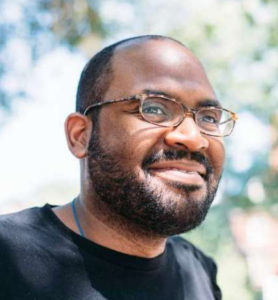In Conversation
The most recent newsletter from the Barre Center for Buddhist Studies features an interview with Lila Kate Wheeler (one of my mentors) and Lama Rod Owens (co-author of Radical Dharma), who will be teaching a course together next month titled: Satipatthana in Dialogue with Suffering and Oppression. (I’ll be taking the course, so stay tuned!)
In the article, the interviewer asks about the idea of the course and what it will cover.
 Lila responds:
Lila responds:
“We will practice the Satipatthana Sutta’s four frameworks – body, feeling tones, mind and liberation – as a lens to focus and look into the roots of suffering and relief. We will also represent contemporary notions of justice, like intersectionality…. As the course title indicates we’ll put the traditional teaching and contemporary understandings into conversation with each other.
“My late Burmese meditation master, Sayadaw U Pandita, told me at the end of an intensive loving kindness (metta) retreat: Metta cannot remain as an internal meditation, it is not strong enough to be called metta until it is completed with acts of body and speech. Mindfulness and wisdom, too, are incomplete until they are practiced in visible ways…”
 Lama Rod adds:
Lama Rod adds:
“I believe that we are desperate in our community for dharma teaching to be linked directly to how dharma should be practiced in the world. It’s nice to learn metta but what does that have to do with being called a derogatory name on the subway? How can I call on goodness and positive goodwill when I am being threatened and especially when I am pissed off?
“I am always having to practice in this way because as a black man in American society, I have a higher risk of facing unjustified violence at even given time. I need my dharma practice to meet the anxiety of what it means to be embodied in this way in this given time.”
Lila continues:
“In our contemporary context, both retreat and daily life instructions teach mindfulness as an internal practice. Its benefits are mapped by MRI and singular brains are called outstanding or abnormally wonderful or just normally messy. This leads us to feel as if the individual were the context for examination.
“But a fuller practice of sati was originally and beautifully mapped out by the Buddha in the Satipatthana Sutta — the Discourse on the Four Foundations of Mindfulness — to include being aware of the bodies, feeling tones, minds and liberation internally, externally, and both. This is very rich territory that hasn’t been explored enough.”
Lama Rod explains:
“To practice an awareness of suffering we must be willing to turn our attention to the reality that what we enjoy comes at the cost of marginalizing others. This is an insight into the nature of interrelatedness as well as karma. Compassion or karuna reminds us of the suffering of others.
“I hope in this retreat that reminding can be further directed towards helping us understand that what we take for granted as being normal often comes at a cost to others. If we can learn to soften our hearts some then we can make more room in reducing as much harm as possible and begin to share more resources and make more room for others.
***
For the full interview, click here.
